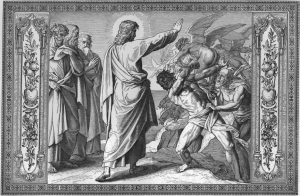
“He, then, who is quickly roused by wrong makes himself seem deserving of insult, even while he wishes to be shown not to deserve it. He who despises wrongs is better off than he who grieves over them. For he who despises them looks down on them, as though he doesn’t feel them; but he who grieves over them is tormented, just as though he actually felt them.” (Ambrose, DUTIES OF THE CLERGY 1.6.21–22.)1
We are conscious of the ones in our lives who accuse us from without. It is easy to feel ourselves becoming defensive and angry when we are unjustly (or even justly) blamed or accused for doing wrong. David provides an incredible example of the precept given by St. Peter.2 Enduring external insult and condemnation humbly while trusting fully in God’s providence and forgiveness train the inner man to stand firm in the face of the inner voices that shame and accuse us. “Resist the devil and he will flee from you.”3 “The accuser of our brothers has been cast out.”4
The perfect liberation Jesus brings to our soul directly counters our spiritual slavery to the devil. This is a slavery to sin of course, but also to temptation and vice. The influence of the devil and his evil spirits in our lives leaves no area of our inner life untouched. This inner influence is not simply occasional or extraordinary, but constant and hidden behind thoughts, attitudes, and behaviors we consider simply our own. Jesus wants the entire “legion” of evil influences and spirits to be cast out of us, but it is up to us to realize and identify what is taking place in our soul. As Saint Gregory the Great said: “A legion of demons has been, as I believed, cast out of me. I would prefer merely to forget all of this that I have known and simply to rest at the feet of the Savior. But lo it is said to me, so strongly as to compel me against my will, ‘Go home to your friends, and tell them how much the Lord has done for you, and how he has had mercy on you.'” (EPISTLE 5.)5
Footnotes
- Franke, J. R. (Ed.). (2005). Old Testament IV: Joshua, Judges, Ruth, 1–2 Samuel (p. 375). Downers Grove, IL: InterVarsity Press.
- “Do not return evil for evil, or insult for insult; but, on the contrary, a blessing, because to this you were called, that you might inherit a blessing.” New American Bible. (2011). (Revised Edition, 1 Pe 3:9). Washington, DC: The United States Conference of Catholic Bishops.
- James 4:7
- Revelation 12:10
- Oden, T. C., & Hall, C. A. (Eds.). (1998). Mark (Revised) (p. 67). Downers Grove, IL: InterVarsity Press.

